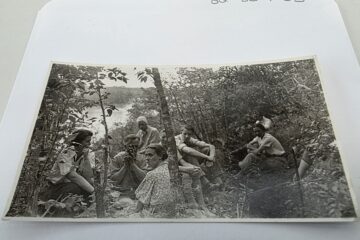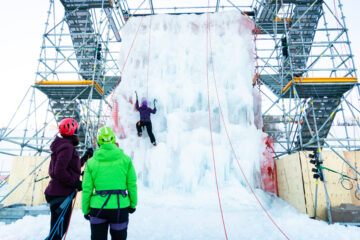ACC Edmonton Relaunch Guidelines
These updates reflect changes to provincial guidelines issued November 24 2020 and effective on November 24 and November 27 2020
UPDATES
Please note that these measures should be considered in-effect until otherwise rescinded by the Section Executive
Accommodations
- Accommodations (including huts) may not be shared, except by members of the same household.
Group Size & Management
- Group size on trips may not exceed 10 persons.
- Members may not share indoor spaces unless they are part of the same household.
Ski Nights
- Ski hill operations are unaffected, and ski nights are considered an outdoor individual activity. Physical distancing is required and masks are recommended.
TRIP GUIDANCE
For Participants
Pre-trip and Waiver
- Participants must pass a health and exposure screening before the start of the camp. A signed declaration will be required. Additionally, the trip waiver has been updated to reflect the possibility of contracting CoVID-19 on a trip.
- Participants must not have traveled internationally in the 14 days prior to the start of a camp.
- Participants exhibiting cold or flu symptoms, or who have been exposed to others with cold or flu symptoms will not be permitted to attend trips or events.
- All participants’ personal gear must be isolated for 3 days before the commencement of the trip.
- Having and using the Province’s Contact Tracing app is highly recommended during all trips.
Personal Protective Equipment (PPE)
- PPE is necessary when physical distancing of 2 metres or physical barriers cannot be maintained by administrative and engineering controls. For the purposes of club trips, PPE includes belay gloves; eyewear; and surgical or non-surgical face masks or coverings.
- Disposable PPE should be packed out and disposed in an appropriate receptacle.
Transportation
- Participants should arrive at the trailhead in their own vehicles or having been dropped off, and with an expectation to be picked up, by a resident of their household.
Group Hygiene
- Participants are to provide their own alcohol-based hand sanitizer and have such on hand at all times.
- Participants must provide their own masks sufficient for the trip length.
- Participants do not engage in physical contact unless they are residents of the same household.
- Participants do not pass around food or beverage to one another unless they are residents of the same household.
- Practice physical distancing of 2 meters for the duration of the trip.
- Complete personal protective practices are required during trips (coughing and sneezing etiquette, hand hygiene (no shaking hands/high fives), cleaning and disinfecting practices).
Belays, Summits and other areas with constrained physical distancing
- Choose routes that allow for appropriate distancing on the belays and summits, or wear masks and sanitize hands during the period when you will be in close contact.
- Make transitions as quick as is safely possible.
- Reduce the amount of time you would normally spend on a summit or alternate people on the top with other parties on rock or narrow alpine routes.
- Maintain appropriate distancing at all rest stops and meal locations. Be vigilant as it is human nature to want to be closer to adventure-mates, especially if weather is inclement.
- Ensure that food and beverage is not passed from person to person except among members of the same household.
Equipment
- No club equipment will be available for rent or use during the pandemic.
For Trip Coordinators
In addition to ensuring the conditions for participants listed above:
Pre-Trip and Waiver
- Inform participants that you are taking precautions to limit potential viral spread and describe those precautions.
- Inform participants that the waiver has changed and that they need to read it over to ensure they understand and acknowledge those changes
- Require participants to sign a declaration of health and exposure. You should limit participation to those who can attest to being well, to not having been exposed to anyone who is sick, and to not having travelled outside their province within 14 days of the commencement of the trip.
- Ask participants to bring their own masks and belay gloves. Masks are only required when going within 2 meters on someone not from the same household.
- All payment should be digital.
- If you have chosen to reduce the overall level of risk on a trip, describe why.
- Inform participants that agreement to come on the trip indicates agreement to abide by the mitigation procedures.
- Inform participants that despite all precautions, one or more may still contract the virus.
- Tell participants that they should be keeping up to date with COVID guidelines as well and provide links to health websites.
Pre-trip Planning for Trip Coordinators
- You may also choose to increase the stringency of your screening by limiting participation to lower risk demographics, or participants who need less hands on instruction.
- Notify participants of the steps being taken to prevent the risk of transmission of infection, and the importance of their roles in these measures.
- Trip coordinators should implement active daily screening of themselves, other camp staff and participants for symptoms of fever, sore throat, cough, runny nose or difficulty breathing.
- Individuals who have a cough, fever, shortness of breath, runny nose, or sore throat (that is not related to a pre-existing illness or health condition) must be in isolation for 10 days from the start of symptoms, or until symptoms resolve, whichever takes longer. – These requirements must be followed regardless of whether or not the individual has been tested for COVID-19.
- Choose routes and/or activities that minimize transfer of gear.
- Avoid crowded areas or popular routes.
- If you need to make a rapid retreat due to an emergent situation, speed trumps the potential transmission of the virus. The immediate safety of your participants is priority one; preventing possible contagion is lower on the list.
Group Hygiene
- Require that participants do not engage in physical contact unless they are residents of the same household.
- Require that participants do not pass around food or beverage to one another unless they are residents of the same household.
- Practice physical distancing of 2 meters for the duration of the camp.
- Promote personal protective practices (coughing and sneezing etiquette, hand hygiene (no shaking hands/high fives), cleaning and disinfecting practices).
Belays, Summits and other areas with constrained physical distancing
- Choose routes that allow for appropriate distancing on the belays and summits, or wear proper masks and sanitize hands during the period when you will be in close contact.
- Make transitions as quick as is safely possible.
- When possible, bring enough snow, rock, and ice pro to minimize gear transfer.
- Reduce the amount of time you would normally spend on a summit or alternate people on the top of the summit.
- Request that other parties maintain their distance from your group.
- If the second group must overtake yours, or vice versa, have you and your participants don proper masks during time of passage.
- Pass or allow passing in places where the terrain allows for proper spacing Rest Stops and Meals.
- Maintain appropriate distancing at all rest stops and meal locations. Be vigilant as it is human nature to want to be closer to adventure-mates, especially if weather is inclement.
- Ensure that food and beverage is not passed from person to person except among members of the same household.
First Aid and Emergency Response
- Carry additional masks and gloves in the first aid kit.
- Use a mask, gloves and eye protection for all first aid applications.
- Dispose of mask and gloves after use.
- If rescue is required, ensure the victim is masked if injuries and condition allows.
Equipment
- Before each trip ensure all group soft goods (ropes, harnesses, slings, draws etc.) have either been isolated for a minimum of three days or have been washed in warm, soapy water.
- Group people together (but 2 meters apart) into couples who will be sharing a rope and other equipment.
- Before each trip indicate to participants that their-owned hard goods (carabiners, ice axes, crampons, pro, avalanche safety gear, skis, ski poles, hiking poles etc.) have either been isolated (from other users outside of their households) for a minimum of three days or have been washed in warm, soapy water. For hard goods with no soft material or plastic, spraying with a dilute solution of bleach and water followed by adequately drying is an acceptable alternative.
Post Trip Communication
- Let participants know that should they show symptoms within 10 days of the camp ending that they contact the Safety Chair (safety@accedmonton.ca) immediately, who will contact all other people who were on the trip reiterate the need for isolating.

